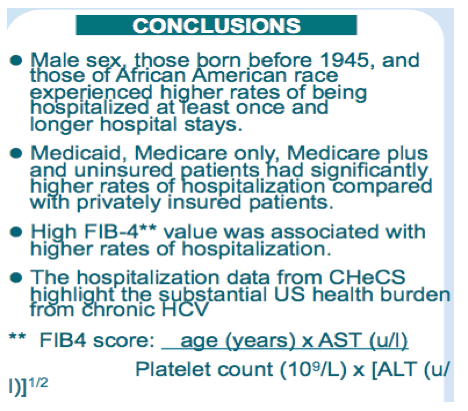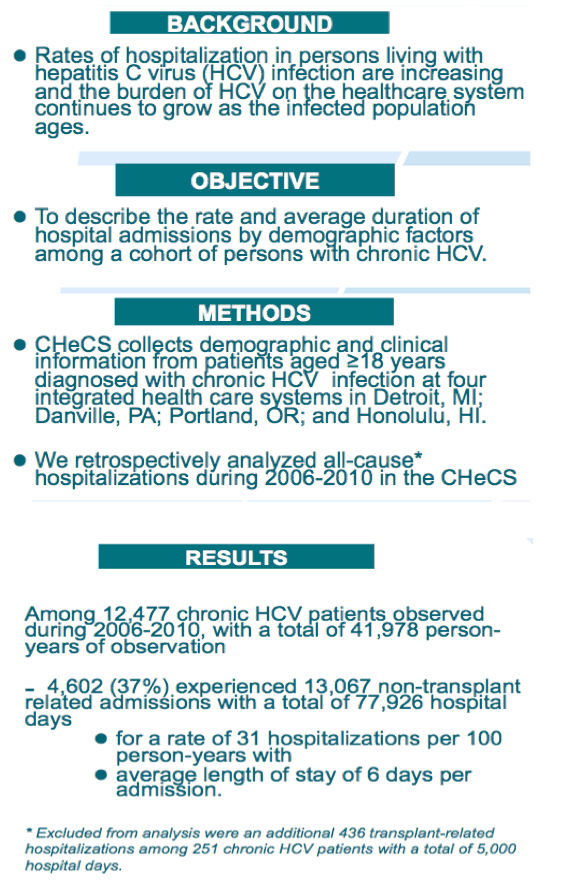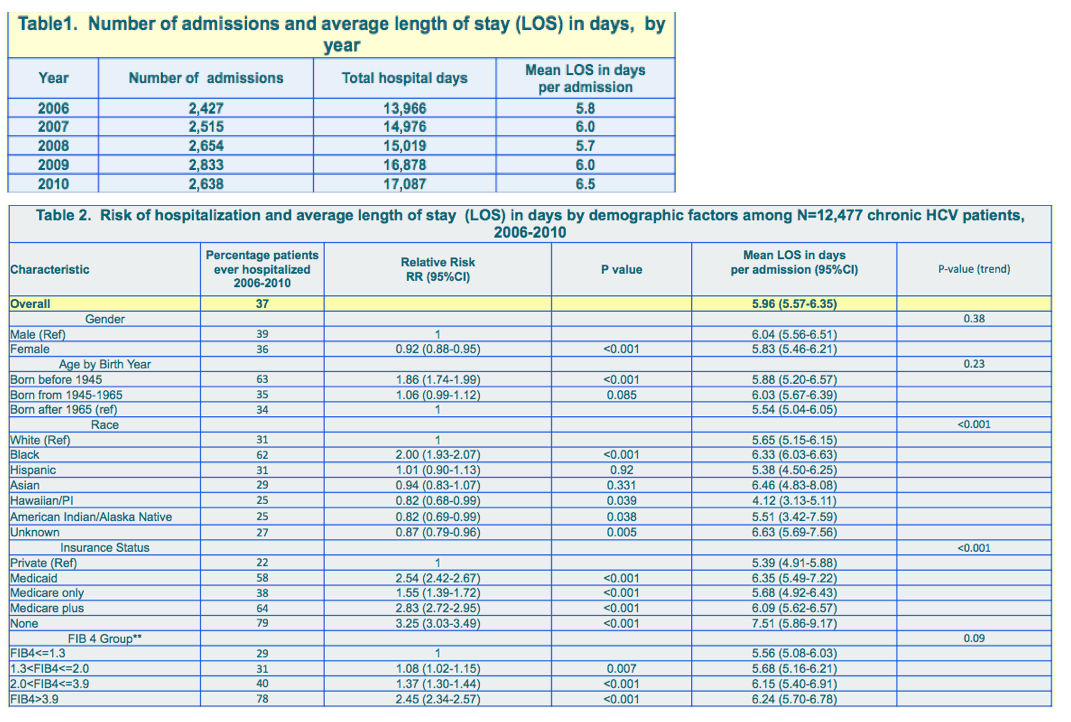 |
 |
 |
| |
Hospitalization among Persons with Chronic Hepatitis C Virus Infection in the United States: The Chronic Hepatitis Cohort Study (CHeCS), 2006-2010
|
| |
| |
Reported by Jules Levin
IDSA 2013 Oct 2-6 San Francisco, CA
37% ever hospitalized, African-Americans double the risk (62% hospitalized vs whites 31%), born before 1945 higher risk (63% hospitalized vs 31% born between 1945-65, 34% if born after 1965), those with advanced disease have much higher rates of hospitalization
Gemechu B. Gerbi * 1 ; Jian Xing1; Loralee B. Rupp2 ; Stuart C. Gordon2 ; Joseph A. Boscarino3; Mark A. Schmidt 4; Vinutha Vijayadeva5; Anne Moorman1; Scott D. Holmberg1; Fujie Xu1 ; for the Chronic Hepatitis Cohort Study (CHeCS) Investigators
1Centers for Disease Control and Prevention, Atlanta, GA USA 2 Henry Ford Health System, Detroit MI, 3 Geisinger Health System, Danville PA, 4Kaiser Permanente Northwest, Portland OR, 5 Kaiser Permanente Hawaii, Honolulu HI.
The CHeCS Investigators include Scott D. Holmberg, Eyasu H.Teshale, Philip R. Spradling, and Anne C. Moorman, CDC, Atlanta, Georgia; Stuart C. Gordon, David R. Nerenz, Mei Lu, Lois Lamerato, Loralee B. Rupp, Nonna Akkerman, Nancy Oja-Tebbe, Chad M. Cogan, and Dana Larkin, Henry Ford Health System, Detroit, Michigan; Joseph A. Boscarino, Zahra S. Daar, Joe B. Leader, and Robert E. Smith, Geisinger Health System, Danville, Pennsylvania; Vinutha Vijayadeva, Kelly E. Sylva, John V. Parker, and Mark M. Schmidt, Kaiser Permanente- Hawaii, Honolulu, Hawaii; Mark A. Schmidt, Judy L. Donald, and Erin M. Keast, Kaiser Permanente- Northwest, Portland, OR.
We retrospectively analyzed HCV hospitalizations during 2006-2010 in the CHeCS, an observational cohort study created to assess the natural history and clinical encounters of chronic viral hepatitis in the United States. CHeCS collects demographic and clinical information from patients diagnosed with chronic HCV at four integrated health care systems in Detroit, MI; Danville, PA; Portland, OR; and Honolulu, HI.

Program Abstract
Background:Rates of hospitalization in persons living with hepatitis C virus (HCV) infection are increasing and the burden of HCV on the healthcare system continues to grow as the infected population ages. The objective of this study was to describe the rate and average duration of hospital admissions by demographic factors among a cohort of persons with chronic HCV.
Methods: We retrospectively analyzed HCV hospitalizations during 2006-2010 in the CHeCS, an observational cohort study created to assess the natural history and clinical encounters of chronic viral hepatitis in the United States. CHeCS collects demographic and clinical information from patients diagnosed with chronic HCV at four integrated health care systems in Detroit, MI; Danville, PA; Portland, OR; and Honolulu, HI.
Results: Among 11,029 patients with chronic HCV infection, 4,616 or 42% (average 8% per year) were hospitalized at least once during 2006-2010. Overall, the proportion ever hospitalized was higher for males than females (43% vs. 41%), for those aged ≥45 years than 18-44 years (44% vs. 37%), and for African Americans (59%) than people of other races (Hispanic: 40%; White: 39%; Asian: 36%). The overall mean length of hospital stay was 2.61 days per person per year (range 2.19-3.23) and was longer for males than females (2.79 vs. 2.42 days), for African Americans (4.90 days) than people of other races (White: 2.05 days; Asian: 1.89 days; Hispanic: 1.87 days), and for those aged ≥45 years than 18-44 years (2.72 vs. 2.43 days).
Conclusion: Male sex, age ≥45 years and African American race experienced higher rates of hospital admission and longer hospital stays. The demographic and hospitalization data from CHeCS highlight the substantial US health burden from chronic HCV, particularly among persons older than age 45 years.


Financial support: CHeCS was funded by the CDC Foundation, which received grants from AbbVie; Genentech, a member of the Roche Group; Janssen Pharmaceutical Companies of Johnson & Johnson; and Vertex Pharmaceuticals. Partial current and past funders include Gilead Sciences and Bristol-Meyers-Squibb.
|
| |
|
 |
 |
|
|